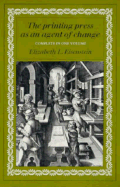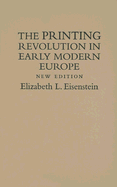Major Works
by Eisenstein
The Printing Press as an Agent of Change

About this title:
A full-scale historical treatment of the advent of printing
and its importance as an agent of change.
'For fifteen years we have been waiting for a deep
level-headed examination of the ways in which print
transformed Europe. Elizabeth Eisenstein has written that
book ... Eisenstein has an intimate familiarity with the
great narrative of modern history since the 15th century.
She boasts an unsurpassed feeling for the strengths and
weaknesses of the ways in which historians have explained
great changes. No mania to find laws or principles of
universal validity drives her. She is not afraid of detail.
Her eye for the telling oddity, the crucial contradiction,
in enviable.'
--Commonweal
'This is a good and important book ... the author's clear
and forceful style makes it a pleasure to read ...
Eisenstein is particularly illuminating and discriminating
on the part played by the great sixteenth-century
scholar-printers, such as the Estiennes, Oporinus, Plantin,
in the emergence of ideals of religious tolerance and
intellectual brotherhood ... She does give us a remarkably
complete and highly critical survey of modern historical
writing on humanism, the Reformation and science up to the
eighteenth century.'
--The New York Review of Books
'Her two volumes represent an extensive survey of the recent
literature on the three intellectual and social movements of
the period 1400-1700: the Italian Renaissance, the
Protestant Reformation and the Scientific Revolution. Ms.
Eisenstein examines the major hypotheses as to their causes
and progress, and reassesses them in terms of the impact of
printing and its products.' The New Republic
Book Description
Originally published in two volumes, The Printing Press as
an Agent of Change is now issued in a paperback edition
containing both volumes. The work is a full-scale historical
treatment of the advent of printing and its importance as an
agent of change. Professor Eisenstein begins by examining
the general implications of the shift from script to print,
and goes on to examine its part in three of the major
movements of early modern times - the Renaissance, the
Reformation, and the rise of modern science.
The
Printing Revolution in Early Modern Europe

About this title:
Although the importance of the advent of printing for
Western civilization has long been recognized, Professor
Eisenstein's The Printing Press as an Agent of Change
provided the first full-scale treatment of the subject. This
illustrated, abridged edition of her earlier work is
designed to give a useful and stimulating survey of the
communications revolution of the 15th century.
Grub
Street Abroad: Aspects of the French Cosmopolitan Press from
the Age of Louis XIV to the French Revolution

About this title:
Eighteenth-century French readers who wanted to keep up with
political and literary trends, had to rely on books and
journals imported from abroad. French writers, such as
Voltaire and Rousseau, also depended on foreign firms to get
their works in print. Grub Street Abroad demonstrates the
importance of extraterritorial publishing for the
Enlightenment and the French Revolution. By placing the
periphery at the center of the stage, it highlights
neglected cosmopolitan aspects of an emergent "public
sphere" and points to forces which undercut Bourbon claims
of cultural hegemony. Firms serving French markets from
abroad are viewed as part of a far-flung communications
network which, although sensitive to diplomatic pressures
from diverse courts, still comprised a relatively
autonomous, independent field of operations. Topics covered
include the publishing and editing of francophone journals
and clandestine manuscripts; the emergence of the book
review and the editorial board; the reliance of the
philosophes upon foreign firms; and the cosmopolitan outlook
of so-called "Grub Street hacks."
The
First Professional Revolutionist: Filippo Michele Buonarroti,
1761-1837

Dr.
Elwell's Home Page
©Frank Elwell
Send comments to [email protected]
.
|